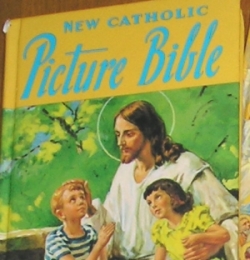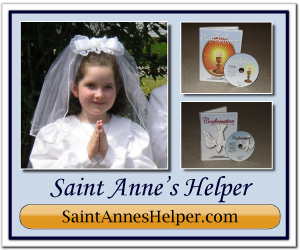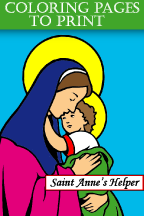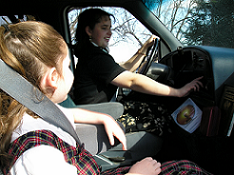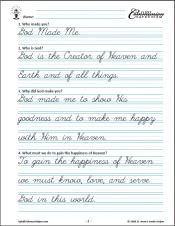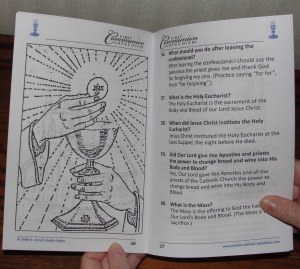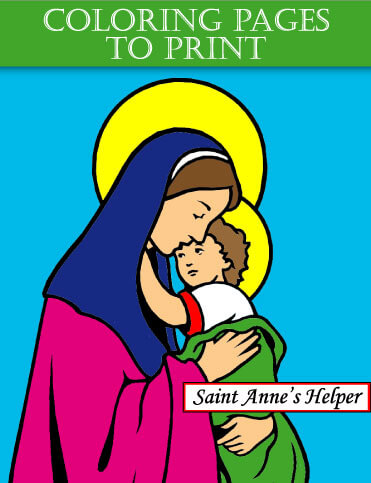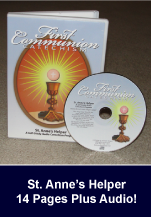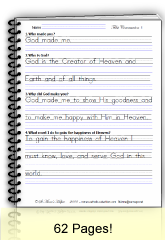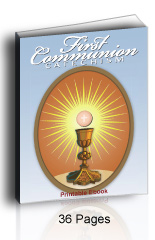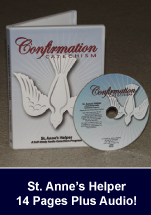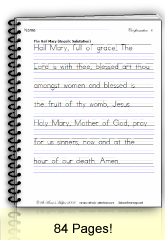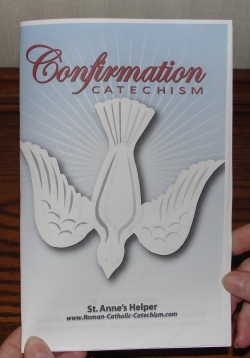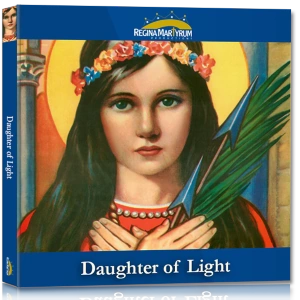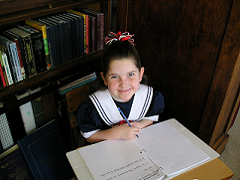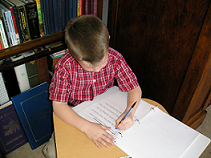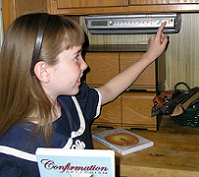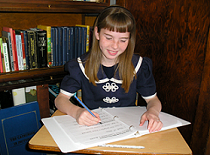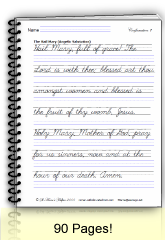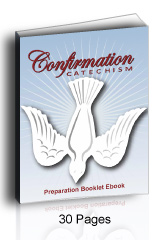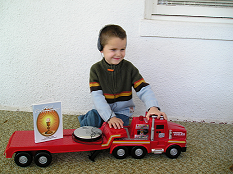- Home
- Communion
Catholic First Communion
1950s Baltimore Catechism
Are You Designing Your Own First Communion Classes?
Teaching your children about First Communion is as wonderful as it is noble. Also, it's relatively simple. Pray. Read. Pray. Study. Pray.
You want your children to love Jesus, to treasure Him, to do what He wills. Truly, all you need is a list of the main catechism questions to learn the answers about the sacrament and to love God.
Really, truly, the main thing is to show your children and students that YOU love God. YOU are grateful for His many graces in YOUR life.
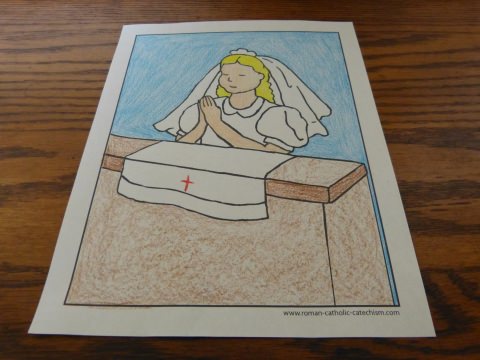 First Communion: A Catholic's most special day! Catechism, coloring pages, audio, and worksheets.
First Communion: A Catholic's most special day! Catechism, coloring pages, audio, and worksheets.Show them that you love the prayers, you love to read the Bible and saint stories by your enthusiasm and joy.
They can do all of this by keeping the Ten Commandments, hearing or reading the stories, and praying daily so that they can be happy in Heaven forever.
It's super simple. Even for us adults.
On this page I show you how to prepare for this most awesome day. Simply.
Teach the Faith plainly and clearly.
You will do all three of these at once, yet prayer is the most important, as a good disposition is the most important "preparation" to receive Jesus well their first time:
- Prepare: Teach the prayers and the main Catholic truths.
- Pray: Pray every day in a lovely way. Invite Jesus and Mary to help you. Ask God for Faith, Hope, and Charity.
- Teach the catechism: Choose the ever concise and timeless Baltimore Catechism. Teach it right the first time.
You pray while you teach, and you prepare your children to pray as you teach the catechism.
We are always praying, preparing, and teaching or learning. Be assured of my prayers for you and your children.
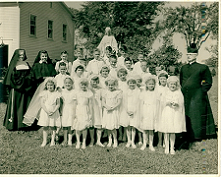 Antique First Communion Class Picture
Antique First Communion Class Picture1. Prepare: First Communion Preparation
Oh, what a wonderful time! First Holy Communion is the first reception of the Holy Eucharist.
Whether you are young or older, your First Communion day is one of the most beautiful days of your life. Usually it is only second in one's life to an ordination or wedding day. Are you:
- Planning ahead for next year?
- Trying to catch up or get help for this year?
- Tired of a fluffy catechetical program?
- Needing the sanity of the Baltimore Catechism for First Communion?
It's super important to prepare your children well without causing pressure or anxiety.
Pray and study well yourself and you will prepare well if you are learning, or you can help your students prepare well if you are teaching.
Hint for beginners: You only need to be a page ahead of your students.
Prepare their hearts first by praying for this grace and by teaching them to pray. If they love Jesus, they will want to prepare well. Tell them stories. Show lovely pictures. If they know Him, they can love Him.
Start class with prayer. If the children pray, they will receive more graces. The more they pray, the more graces they will receive.
This applies in catechism class throughout the year, but also for the days and hours before First Holy Communion Day. Keep the questions and answers quick and light, especially for young children.
If you're teaching your own children, First Communion preparation starts from their earliest days. Teach them:
- To join you in your daily prayers and the family Rosary.
- About Jesus and Mary and their friends the saints.
- How to sit still for family Rosary, Mass, and quiet reading time.
- To do good and to avoid evil.
- To be sorry and to ask forgiveness.
- Teach them the Ten Commandments and Rosary prayers by the time they are in kindergarten.
Every day of our lives should be filled with lessons for loving Jesus, doing good, and avoiding evil. This is so much easier if you homeschool, yet it is possible for you to teach both in a classroom and at home.
These next books are the easiest books I have found for you to teach the prayers, answer the questions, show pictures, and tell the stories.
Best Baltimore Catechism Books For First Communion
Disclosure: I show products that I think will help you. If you use my links, I may earn ad commissions at no extra cost to you. As an Amazon Associate I earn from qualifying purchases.
The best Baltimore Catechism book that I have seen for a First Communion Catechism for children with pictures is Jesus Comes (available at Amazon), from the Our Holy Faith series, Vol 2, re-published by St. Augustine Academy Press. Here is the Teacher's Manual.
It has the Baltimore Catechism questions for the Holy Eucharist, the sacraments, Ten Commandments, and Communion prayers.
It has extra questions for each Commandment that some call "The Tells and the Forbids". This commandment "tells me" and the same commandment "forbids me", etc.
The Ten Commandments are important for confession preparation, yet the "tells and forbids" can be way too much for many first and second grade children to memorize. Simply review them for teaching children how to prepare for confession. Have older children read, study, and memorize.
It's also got beautifully modest pictures. Even Adam and Eve are modestly pictured.
Saint Anne's Helper has audiobooks, ebooks, and digital printable worksheets to use with this book. 'Just the basics. No fluff.
Add a Bible and Saint book to have plenty of stories and pictures for K-2 First Communion catechesis - kindergarten through second grade.
Our Holy Faith Jesus Comes Book 2: Teacher's Manual
This may be the only First Communion catechism you need.
Teacher's Manual covers ideas for children ready to receive the Eucharist.
Includes Bible stories, Commandments, the Mass, confession, and the Last Supper. Buy this catechism TM at Amazon.
New Catholic Picture Bible Stories
Little ones love when you use the New Catholic Picture Bible like a photo album.
Share the Bible stories as if they are stories from your own life because they are. God wants to be part of our every day lives. :-)
Buy this picture Bible at Amazon.
Catholic Picture Book Of Saints
Excellent saints book for Communion and Confirmation.
Get to know the saints and choose a Confirmation name.
Old and New Testament Biblical and historical saints. Buy this saints book at Amazon.
1.A. Our First Communion Story
I was asked by our pastor to teach the First Communion class when our oldest child was preparing for the same class.
What a humbling responsibility!
Yes, we as a family were praying and wanted her to learn well; yet now I was responsible for helping other children do the same. This is when we started praying for all our students.
In preparing them for their Catholic First Holy Communion (there are Anglican services. Note that this site is dedicated to the seven Roman Catholic sacraments....), both as catechists and as parents, we found that our children learned more easily when they memorized the short and clear Catholic answers in the Baltimore Catechism. Thank God it was what Father had assigned.
The same goes for adults, too.
In the course of the last twenty-five years, we have also found that many other parents and teachers wanted an easy way to teach the answers or tutorial help teaching them.
So we made CDs.
First for our own children; then for nieces, nephews, and godchildren.
Soon people were coming to our door with money, asking for these recordings. Voila! Saint Anne's Helper's first product was born.
Over the course of three decades, our best recommendation for you is to stay with the 1885 and 1950s Baltimore Catechism (above) or Deharbe's Small Catechism for First Communion.
These books all teach
- The singular confession answers (I not we),
- Original sin, angels, etc.
- The best form of the prayers.
- See more distinctions and catechism answers here.
Our Holy Faith Jesus Comes Book 2
This may be the only catechism for First Communion you need.
Covers all info necessary to receive the Eucharist.
Includes Bible stories, Commandments, the Mass, confession, and the Last Supper. Buy this catechism at Amazon.
1.B. Preparing for Communion Day
Through the year your child will study and learn the answers and prayers.
He or she will pray for Jesus to come.
The best way to prepare for the big day is to take them to church with you and go to several extra liturgies that are similar to getting in line and going to the altar "like the big kids".
To practice going to the altar take advantage of the feast of St. Blaise, Ash Wednesday, or Good Friday when children can go to the altar rail to receive blessings, ashes, and kiss the Foot of the Cross. These are more simple than receiving Communion, and are less pressure because they can go with you and your family.
Keep certain things away from those last days before First Holy Communion Day:
- Last minute shopping for communion gifts - alternatively buy before Easter if you want white socks and shoes, etc.
- Buying last minute items of clothing - keep a watch on sales at wedding shops and
- Party arrangements - make them simple.
- Distracting trips during the last week - arrange your calendar so that your child can be at home with the family for Rosary each night and wholesome activities with family rather than running to stores and shopping for goodies. Many times, there's at least one child who cannot receive due to an upset tummy or nerves.
Review the catechism questions that focus on the Holy Eucharist. You can see the most popular before and after Communion prayers at the bottom of this page as it has all of the Baltimore Catechism questions and prayers for Communion
If you have other children, they might like to color Communion coloring pages to give as sweet gifts to this year's new communicant. Say the family Rosary together.
Be sure that your children are able to go to confession before their First Communion. For over forty years some parishes have omitted this and it's too bad because a good confession is the best way to make our souls clean for Jesus.
Try to go to Mass with your children through the week and on the previous day and go to confession the previous evening if it is not offered at school.
Confession is the most important preparation for receiving communion for any of us, but most especially for our first reception.
We need at least frequent acts of contrition, so add this to your daily Rosary.
Treat the day before First Holy Communion as a special day of quiet reading, praying, and playing.
Do keep the spiritual side of the Holy Eucharist first in mind as the most important event of the actual day.
2. First Communion Prayers For Children
2.A. Pray With Your Children
As above, the first most important thing when preparing for Communion is to pray.
Through the First Communion year teach the Act of Contrition and the Rosary prayers; and pray them every day with your children or your class.
This is great for kindergarten and first grade and even earlier at home. Teaching the prayers early removes academic pressure from the preparation classes and is super easy in a Catholic homeschool.
If you're teaching children about communion in a class; start class with a these prayers and build each week with:
- the Sign of the Cross,
- a Hail Mary,
- an Our Father,
- a Glory Be,
- and the Act of Contrition.
Poof! Those are the main prayers they will need for both confession and Communion and if you say them every day, the children will remember them for life.
Our spiritual disposition is the most important element in making a good Communion, so you'll want to make a special moment before these daily prayers by making a reference to what you're learning and what great graces your children will receive. Make it special.
The best way to learn these prayers is to pray them every day, both for practice and for the self same grace to be able to pray them and thereby to gain graces throughout life.
An awesome idea is to teach the prayers and Ten Commandments the year before the Communion year during kindergarten and first grade, if it's usually in second grade. This way there's less "work" to do during the actual First Communion year and therefor less study and pressure.
When our children were little and especially when they were in kindergarten and first grade we had them join us:
- in answering our daily Rosary,
- the Angel of God prayer (see the Fr. Lasance Missal longer version that has excellent sentiments),
- and the Perfect Act of Contrition every night.
Learning how to pray the family Rosary is the easiest way to learn the confession and Holy Communion prayers.
By kindergarten or first grade children are ready for the Ten Commandments. Be sure your children learn the Catholic Ten Commandments well and early as it can be hard to undo childhood mistakes later.
These Ten Commandment coloring pages are very helpful, too.
2.B. Tell the First Communion Bible Stories
Usually a good First Communion class, whether you are a catechist or studying at home, also teaches some Communion saints like:
- St. John the Baptist,
- St. Pius X and Blessed Imelda and some
- Bible stories like Adam and Eve (Creation, Original Sin),
- Noe and the ark,
- Abraham (Father of Faith), and
- Moses (Passover, Ten Commandments).
Telling the stories alone can be enough, especially if you are Sr. Mary Delightful or Mrs. Enthusiastic, but you'll find that it is nice to have real books for pictures.
I like to use a children's Bible and picture book of saints like a photo album so that I can flip through the pictures while I tell or read the stories.
New Catholic Picture Bible Stories
Little ones love when you use the New Catholic Picture Bible like a photo album.
Share the Bible stories as if they are stories from your own life because they are. God wants to be part of our every day lives. :-)
Buy this picture Bible at Amazon.
Use the Baltimore Catechism?
Disclosure: I show products that I think will help you. If you use my links, I may earn ad commissions at no extra cost to you. As an Amazon Associate I earn from qualifying purchases.
2.C. Go To Mass Often
Be sure to take your own children to daily Mass as often as possible.
Praying in front of the Blessed Sacrament, especially during Mass is the best way to prepare to receive Jesus.
It is also the best preparation for the First Communion ceremony. Children see what happens better during the week if there are fewer people in the congregation.
The more often your children are able to see the Mass in practice before their First Communion, the more graces they will receive. They may also be less anxious on their own beautiful day.
During the summer you can go to daily Mass and sit toward the front so that your children can see the altar and see other people kneeling to receive Communion.
Extra trips to daily Mass add up to many more graces and are also a bit of an enticement for children to desire Holy Communion and to be more comfortable going to Mass.
Hint: Do not emphasize that they watch the Communion line. That can be a hard habit for children to break in later years.
Daily Mass is also a great teacher if you have boys who hope to become altar servers. The more times they see the Mass, the better they will remember the server's moves and responses.
If your boys can follow their Missal, it's all the better for understanding what they'll do as altar boys and perhaps someday as priests and religious. Some children are mighty sharp by first and second grade. See a priest coloring page here.
Teach them how to fold their hands and walk at a stately rate up the aisle to the altar. You can practice at home or in class. One year, I rolled toilet paper as nice lines to practice staying alongside the line.
As above, there are several times that we can help the children practice processing to the Communion rail. Tell them ahead of time what to expect and practice if you have time:
- Feast of St. Blaise for the Blessing of Throats.
- Ash Wednesday to receive ashes.
- Good Friday for the Veneration of the Cross.
If you are able to take your children to these events with the whole family, or class, they will know how to proceed in the Communion line with the confidence of having done it several times with Mom and Dad or with their class. They will have seen the whole congregation as an example.
When it comes time to explain the Communion procession all you'll have to say is, "It's just like the Feast of St. Blaise. Fold your hands, pray, and stay in line."
2.D. Tour the Confessional And Go To Confession
Since going to Confession is a major part of preparing well, eventually you'll want to give a tour or two of the confessional before the First Confession.
If the First Communion class is not doing this, ask Father or Sister if you may show your children the confessional.
Certainly you can show your children where it is in church and practice at home.
Practice going to Confession at home in a private place. This helps avoid embarrassments and distractions.
The main thing to practice is the routine "Bless me Father for I have sinned...." elements and the prayers like the Rosary prayers and Act of Contrition.
Father is likely to assign Hail Marys or Our Fathers for the penance. They and the Act of Contrition is part of the confession list of prayers, a subset of the list of the Rosary and Communion prayers.
Since an examination of conscience depends on the Ten Commandments, these are very important to know while preparing for the sacrament of Penance - all throughout our lives.
Study them through the year with simple examples for each Commandment. We have some Commandment coloring pages here.
A nice help with the Catholic Ten Commandments is to teach each one by itself with its number and also to have the student count with his fingers.
In case he loses his place when he is reciting to Sister or you, he can more easily recover where he is by noting how many fingers he has counted and saying the number. This is very helpful with any answers that have numbered responses.
I've seen the Ten Commandments Song used in some catechism classes where the tests were worded like it, so we have included the words to it on our First Communion Audio Catechism CD.
It and the Apostle’s Creed Song can be found on the 24 Catholic Songs recording carried by Our Lady of Victory School in Post Falls, Idaho. It has a matching coloring book, too.
If your children or students already know the Ten Commandments and the main prayers in kindergarten, it's much easier to learn about the other questions in class.
Learning the “tells” (number 22...) early can also help the student discern the “forbids” easier later in the year.
The "tells" and "forbids" answers are usually too much for little children to memorize well (and too much for some of us adults); yet they are very good for them to hear so as to make their first Confession easier.
The main thing the priests and nuns look for whether children are ready for confession and Communion is whether they are of the age of reason.
What is the age of reason?
The age of reason is when a person can distinguish between right and wrong, big sins and little sins.
Once a child can tell the difference between a mortal sin and a venial sin, he is culpable of sin and thereby needs to be able to go to confession.
How do you tell?
Ask questions.
Can the child see the difference between taking a pencil from his friend and taking a bike? Etc.
Hint: Once we know what a mortal sin is, venial sins are easy. They're all other sins. If a sin is not a mortal sin, it is a venial sin.
3. Teach The Baltimore Catechism First Communion Answers
3.A.Teaching Children About Communion
Will the real Catholic catechism please stand?
Or the real Baltimore Catechism?
What are the basic minimum facts?
Mainly your child needs to know that Jesus is God and that He is the Host after the Consecration, the most important part of the Mass.
It really only takes about ten to fifteen weeks teaching one lesson per week to cover the information in the catechism.
You can start any time during the year and can add this to whatever else you're doing, or make a plan to start in September or February to coordinate with the school year.
On the part of the catechist, once the teacher or parent has lovingly told the story of God's Creation, Adam's Fall, and God's promise of a Redeemer most children have the love necessary to want to learn about their First Communion.
On the child's part this is often due to the gift of Faith received in Baptism and fostered by prayer; not talent, academics, or material advantage and resources.
The children who remembered what Sister said best were the ones who did not have crayons and activities as distractions.
Rev. Fr. Leo Pyzalski wrote an excellent book on this point, The School Sister's Vade Mecum.
Reading the book was a huge relief to me because he showed how the children learned better and loved Sister better without the extra activities and distractions.
If you're not seeing this love in your children don't worry, it usually doesn't gush forth which can be good so as to keep loving God honorable and dignified.
Receiving Communion should always be a solemn occasion.
It is important when teaching children about Communion that they know that the Blessed Sacrament (Communion) is the Body and Blood, Soul and Divinity of Jesus. Simple. It is the main distinction they need to know.
- Before the Consecration, which is the most important part of Mass, the white wafer is bread.
- After the Consecration It is God Himself, Creator of Heaven and Earth.
Tell the children.
So many priests will ask this very question, yet some catechisms do not explicitly include this in the Q&A, meaning that they do not say it in so many words so we might forget to mention it.
Now you know ahead of time and can remember to teach it before Father asks. Mark your books.
Teaching anyone most any new information, adult or child, but especially teaching children about Holy Communion, requires some drill and much love.
Drill and practice is where our audio CDs have been a huge help, especially for our audio boy. Headphones worked like magic for him, he started understanding and repeating the right words immediately.
See a detailed explanation of the Catholic answers here and a list of Communion answers here. They all correspond with the Jesus Comes Baltimore Catechism book.
Learn more from good Catholic books:
Our Holy Faith Jesus Comes Book 2
This may be the only catechism for First Communion you need.
Covers all info necessary to receive the Eucharist.
Includes Bible stories, Commandments, the Mass, confession, and the Last Supper. Buy this catechism at Amazon.
3.B. The Difference Between Eucharist And Communion?
What is the difference between the Blessed Sacrament, the Holy Eucharist, and Communion?
Nothing. It is Jesus in different aspects.
The Blessed Sacrament is Jesus, the Holy Eucharist is Jesus, and we receive Jesus in Communion.
The Eucharist is what we receive in Communion and we also call It Communion, or the Communion Host. "I received Communion", etc.
Some catechism answers are very close to each other, so it can be hard to remember the difference between them. Here's an easy way to remember and to teach your children:
- The Holy Eucharist is the Sacrament.
- The Sacrifice of the Mass is the Offering.
- Communion is the receiving.
Say it three times each with enthusiasm and energy:
- Eucharist is the Sacrament. Mass is the Offering. Communion is the receiving.
- Eucharist is the Sacrament. Mass is the Offering. Communion is the receiving.
- Eucharist is the Sacrament. Mass is the Offering. Communion is the receiving.
3.C. What Is The Mass?
What is the Mass? Many Catholics today do not know that the Mass is the sacrifice of Jesus' Body and Blood.
Many have not even read the definition of what the Mass is, was and always will be.
- "The Mass is the offering to God the Father of Our Lord's Body and Blood."
It is the sacrifice that effects, or makes, the sacrament of the Holy Eucharist.
Years ago, people used to learn the definition in Catechism class.
If your catechism doesn't include these questions you might want to supplement it using Saint Anne's Helper's CDs and downloads. You can keep a copy of the CD in the van and one in the kitchen, etc., handy for easy review.
The 1885 and 1950s Baltimore Catechism makes it easy to learn the Catholic prayers, answers to the catechism questions, and the Catholic Ten Commandments. It has an easy and clear formula for the questions and answers that is easy for students to learn - with practice that is. What you will like is that it's also improved some answers like changing the confession questions to the singular so children aren't confessing "our" sins. :-)
3.D. First Communion Teaching Resources
i. Tutorial Help: First Communion Audio Downloads and CDs
If you want the best Communion catechism, yet you do not have the time or the money for lots of books and activities, you will appreciate having recordings and worksheets.
You might even have children who are at different levels learning the same material. Great. We have both manuscript and cursive worksheets.
For catechists: Some days we look out over our classes and wonder if the families ever even pray the Rosary and whether the children will have help learning the Catholic prayers.
It is so sad to see some children without help, or even adults who have no one with whom to practice their prayers and Catholic Ten Commandments. If this is the case, you can offer them the audio CDs. They're like having a tutor for review. In case of necessity, contact us we can send you the downloads.
I am super happy to offer you our St. Anne's Helper Audio Catechisms and Catechism Worksheets (see below). They can help you answer this need, too. They are excellent for First Communion catechism class since they teach the truths related to the Mass and the Holy Eucharist as well as those about Baptism and the sacrament of Penance. They help your student learn the Catholic truths easily and to prepare for a holy reception of the sacraments as they begin to learn to know, love, and serve God in this world and to be happy with Him in Heaven.
These free videos of the Rosary have the words to the prayers. The bead moves, too, so it is easier to follow the Rosary. It's great for daily use and helps kids learn the prayers. And like audio downloads, you can use these over and over. Kids love them!
ii. Printable Copybooks - Catholic Worksheets
St. Anne's Helper Audio Communion Catechism copybooks, or printable worksheets, are super handy for having the children practice their answers in writing. They're digital, so your students can answer them on the PDF and return their work to you digitally.
Learning the answers orally can be enough, obviously, since books and paper were not easily available throughout the centuries, yet these make easy practice and review for today's busy families.
If your school or program requires that the children be able to write their answers, it is good to have the children copy the answers word for word. Since they're digital, you can email these to parents or a print shop to print.
Copy work is a wonderful reinforcement, but do keep assignments super simple as academics are not the name of the game here.
Copying the answers can help with the memory work required in some parishes. They are a great help for reviewing for any cumulative quizzes, yet an oral review is so much handier and much more direct for most children. Take the time to help them review.
Once the student understands the questions, the audio recordings can be used to help with memorization and review.
The printable worksheets can help with manuscript and cursive writing practice. This is true even in later years in school when you would like to give the children extra Catholic handwriting practice.
Our First Communion copybook comes with both versions, manuscript and cursive, and you can print for as many children as you have. Use them in penmanship class.
iii. Printable Communion eBooklet With Coloring Pages
The printable Communion catechism ebooklet has
- The same text as the Audio and Copybooks.
- Some pictures to color.
- You can reprint these as often as you need them.
iv. Catholic Coloring Pages To Print
We also have a printable coloring book that has many Catholic coloring pages:
- Sacraments,
- Bible stories,
- Holy days,
- Saints,
- and more.
There are also many secular coloring pages that are in their own files to use throughout the year for any class or activity:
- seasons,
- animals,
- plants, etc.
See our digital coloring pages here.
More First Communion Resources
Audio Baltimore Catechism, Catholic Worksheets, Catholic eBooks, and Catholic Coloring Pages:
Catholic catechism resources for your Roman Catholic catechism class, Faith formation, Catholic homeschool, religious education, or Sunday school lessons. Save on bundles!
Order our Baltimore Catechism worksheets. Choose your favorite fonts, colors, and SIZES on our fillable digital interactive worksheets and coloring pages. Paperless or printable.
First Communion Preparation Baltimore Catechism No. 1 For Children And Adults - Or get the bundle.
Baltimore Catechism Communion single or bundled downloads: audio, ebooklet, and digital worksheets for kids and adults. Verbatim text in all formats.




